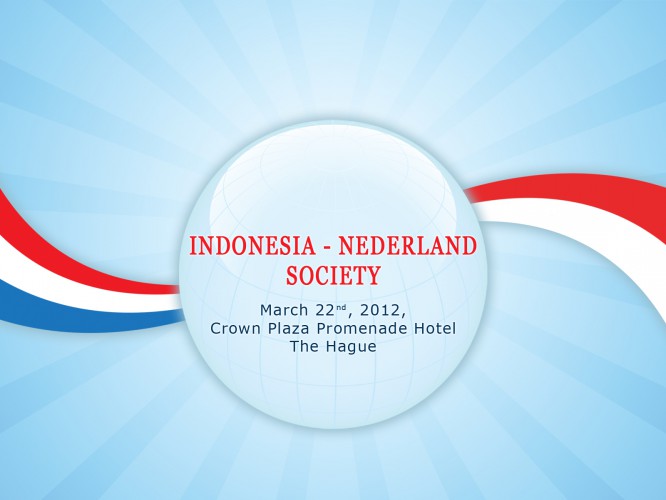22 Mar 2012
Misschien is het zo dat vandaag Indonesië voor Nederland belangrijker is dan Nederland voor Indonesië, maar er zijn zeker mogelijkheden. Ambassadeur Marsudi sprak over een speciale relatie 2.0, een nieuw model zoals in de computerwereld. Indonesië is daartoe bereid, getuige de aandacht voor de Pasar Malam, de grootste culturele manifestatie van Indonesië in de wereld. Getuige ook de benoeming van ambassadeur Marsudi, die tevoren een van de hoogste functies in het ministerie van buitenlandse zaken bekleedde. Nederland kan een poort zijn naar Europa en een aantal van onze sterke punten kunnen bijdragen aan de oplossing van Indonesische problemen. Kijk naar de waterbouw rond een zinkend Jakarta, het Borneo Initiative om de tropische bosbouw duurzaam te maken, de nauwe samenwerking op een aantal wetenschappelijke gebieden, en de uitwisseling van studenten en hoogleraren. Op een aantal terreinen bestaan goede commerciële mogelijkheden, mits het bedrijfsleven bereid is tot een langdurige structurele relatie. Die voorwaarde geldt trouwens voor alle economische contacten in Azië.
Het gaat er nu om vooruit te kijken en te proberen uitdagingen aan te pakken en mogelijkheden uit te buiten. Geen Tempoe Doeloe, maar betrekkingen op voet van gelijkwaardigheid en met respect voor elkaar. Indonesië heeft sinds zijn onafhankelijkheid een prestatie van betekenis geleverd. De eenheid van het land is bewaard gebleven, de welvaart is toegenomen en een aantal moeilijke problemen zijn aangepakt. Kijk naar Atjeh waar, mede dank zij internationale hulp, weer rust heerst. Onze media hebben nog te weinig aandacht voor de positieve aspecten in dat onmetelijke eilandenrijk.
Het thema van de openingsbijeenkomst was dan ook ‘challenges and opportunities’. Dr Alexander Rinnooy Kan, Voorzitter van de SER, gaf een inhoudelijke aanzet en werd gevolgd door een elftal sprekers met korte interventies van prominente Nederlanders uit verschillende delen van de samenleving, politiek, industrie, wetenschap en onderwijs. Zij lieten horen hoe kansrijk zij een vitale band tussen het moderne Indonesië en Nederland achten. Primair gaat het erom elkaar wederzijds beter te leren kennen en samen te werken op die terreinen waarop de landen elkaar kunnen versterken.
De Indonesia Nederland Society wil bijzondere aandacht geven aan economie, cultuur, wetenschap en andere maatschappelijke vraagstukken. Tot de activiteiten zullen behoren: het organiseren van symposia en contacten voor het bedrijfsleven, onderwijsinstellingen, kennis- en onderzoeksinstituten, ondermeer ter gelegenheid van belangrijke bilaterale bezoeken.
Het is de bedoeling in beide landen een afdeling van de Society te stichten, die nauw met elkaar samenwerken maar wel autonoom zijn. In Indonesië zal nauw contact worden onderhouden met de Nederlands-Belgische Kamer van Koophandel.
‘One condition is crucial: getting to know each other better and working together on those fields where both countries could strengthen each other.’
On March 22, at the Promenade Hotel in The Hague, the Indonesia Nederland Society was officially launched by the organizing committee, chaired by Dr. W.F. van Eekelen (former Minister of Defense) and consisting of the following members: Mrs. Joty ter Kulve-Van Os, Mr. Silfraire Delhaye, Mrs. Monica Bouman, Mr. Frank Marcus and Mr. Ate Oostra.
The event was co-organized by the Indonesian Embassy. The launching of the INS was also an occasion to introduce the new Indonesian Ambassador, HE Mrs. Retno L.P. Marsudi, to the more than hundred representatives of Dutch organizations. Twelve prominent Dutch citizens commented on the launching of the Indonesia Nederland Society, under the title ‘Challenges and opportunities’. The speakers contributions, the warm response of the audience and the fine meal offered by the Indonesian Embassy, made the launching of the INS an expression of the friendship between the two countries that the INS aims to further.
Dr. W.F. van Eekelen in his opening statement first payed tribute to the late Ambassador Habibie who had passed away two few weeks earlier. ‘We remember his warm personality, his understanding of the peculiarities of Dutch society, and his generosity in inviting veterans from the Netherlands to the flag raising ceremonies at his residence on 17 August.’
Then Dr. Van Eekelen introduced the new Indonesian Ambassador to the Netherlands. H.E. Mrs. Retno L.P. Marsudi, who in Jakarta had occupied one of the highest positions at the Ministry of Foreign Affairs. In her address Ambassador Marsudi called the relationship between Indonesia and the Netherlands a 2.0 special relationship, from which both countries each could benefit. Indonesia was ready to start this new model.
Dr. Alexander Rinnooy Kan, chairman of the Social and Economic Council, gave in his introductory remarks a substantial impetus on behalf of the ‘BV Nederland’. After him eleven prominent Dutchmen and one Dutchlady, from different angles of society – science, politics, business, education – gave their view on the potentially promising relationship between Indonesia and the Netherlands. One condition is crucial: getting to know each other better and working together on those fields where both countries could strengthen each other. Short interventions came from: mr. Frits Korthals Altes (Minister van Staat), dr. Bernard Bot (Former Minister of Foreign Affairs), mr. Jesse M. Kuiper (The Borneo Initiative), prof. mr. Laurens Jan Brinkhorst (Former Minister of Agriculture and former Minister of Economic Affairs), mr. Hans van Baalen (Member of the European Parliament), drs. Yvonne van Genugten (director of the Indisch Herinneringscentrum Bronbeek), mr. Rennie R. Roos (Student in Leiden and Yogyakarta), mr. J.H.N. van Ameijden (Damen Shipyards), prof. dr. D.E. Grobbee (International Health Sciences, Universiteit Utrecht), mr. Jan Kees Wiebenga (Member of the Raad van State), and dr. Nikolaos van Dam (Former Ambassador in Jakarta).
In his comments Dr. Van Eekelen stressed the importance of relationships on equal footing and with mutual respect. He expressed his profound appreciation for Indonesia’s high accomplishments since its independence: the country preserved its unity, grew in economic prosperity and had token difficult issues, one of which was the positive developments in Aceh after the tsunami. It was a pity that ‘Our media pay too little attention to the positive aspects of this enormous archipelago.’ He concluded by saying: ‘We believe that it is high time to build upon the positive aspects of our common heritage and the real friendship existing between so many people from Indonesia and the Netherlands. Because we feel that in the Netherlands many people are lacking in their knowledge and understanding of Indonesia as it is today: a rising economic power, a moderate Islamic country, which puts great emphasis on education and human values.’




